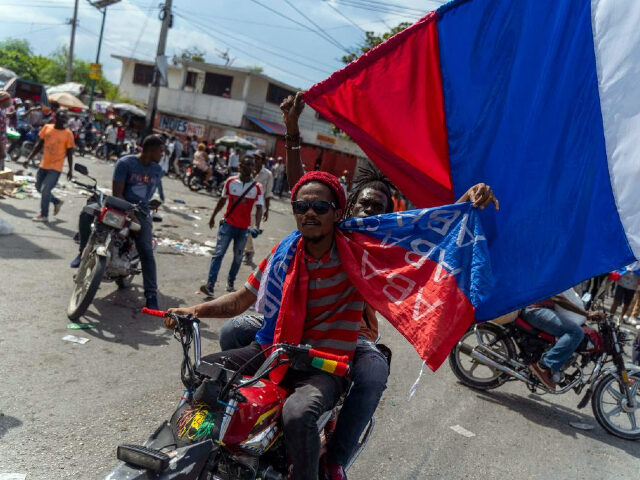Haitian gang leader Jimmy “Barbecue” Cherizier announced on Sunday that his thugs have magnanimously decided to allow fuel shipments to resume from the Varreux terminal, which they have been blockading with barricades and trenches since September, creating nationwide fuel shortages and making Haiti’s humanitarian crisis even worse.
“Once again, the drivers and employees of the Varreux terminal can come down without fear,” Cherizier said in a videotaped announcement.
“We’ve decided among us… to allow for the gas to be released,” he proclaimed.
Haitian police announced they were in control of the terminal on Friday, ostensibly after the successful conclusion of an “operation from Wednesday to Thursday with an aim of allowing the resumption of activity at the main oil terminal.”
The police posted a Facebook video of armed officers and armored vehicles patrolling around the terminal, but they also said “the operation continues,” and there were no immediate shipments of fuel. The Haitian government issued a statement over the weekend that said fuel would become available on Monday, but that statement was challenged by diplomatic sources, and spokesmen refused to confirm or deny it on the record.
“Our government is working hard on getting our citizens back to everyday activities. We appreciate the efforts of the national police forces. We need schools to reopen. We need to go to elections so our country can have legitimate institutions,” a government spokesman said after Cherizier released his video proclamation on Monday.

TOPSHOT – A mans walks past a burning barricade during a protest against Haitian Prime Minister Ariel Henry calling for his resignation, in Port-au-Prince, Haiti, October 10, 2022. – Protests and looting have rocked the already unstable country since September 11, when Prime Minister Ariel Henry announced a fuel price hike. (Photo by Richard Pierrin / AFP) (Photo by RICHARD PIERRIN/AFP via Getty Images)
Cherizier, a former Haitian police officer, leads a coalition of violent gangs that calls itself the “G9 Family and Allies.” The name G9 refers to the nine major gangs that were founding members of the coalition in 2020, and was chosen to mock the designations given to international coalitions, like the G7 and G20 economic groups.
Cherizier’s police career ended with a pair of massacres, the execution of at least 14 civilians during an “anti-gang operation” he was involved with as a police officer in 2017 and the La Saline Massacre of 2018, in which up to 71 people were murdered. He was fired from the police force after the La Saline Massacre and warrants were issued for his arrest, but he had little difficulty staging further mass killings and gang fights, culminating in his formation of the G9 Family in June 2020.
Cherizier was so successful as a gang leader because his coalition was allied with former President Jovenal Moise, who allegedly supplied the G9 with cash and weapons in exchange for their services as an exceptionally vigorous get-out-the-vote operation.
The G9 Family initially billed itself as a sort of volunteer militia that would help the Moise administration restore public order in Haiti’s most impoverished neighborhoods, but after Moise was assassinated in July 2021, the G9 became an increasingly open and violent insurrection against the government led by Prime Minister Ariel Henry.
Cherizier continues to demand “justice” for Moise’s killing and posture as a champion of the poor, even as his actions indisputably make their already difficult lives even worse, especially his penchant for blocking fuel deliveries. The G9 Family has grown to over 20 gangs, racking up hundreds of murders and kidnappings as it grew.
“If Ariel Henry resigns at 8:00, then at 8:05, we remove all the barricades, so the trucks can come to the fuel depot and fill up, and then the crisis will stop,” Cherizier said in October 2021 during the first round of G9 gas blockades.
After G9 seized control of the vital Varreux fuel terminal in September, Cherizier presented a list of demands for the government, which he billed in a Facebook video as a “transition plan” that would cede much of the state’s power to himself and the G9 Family. Among his demands were blanket amnesty for G9 gang members, cancellation of outstanding arrest warrants for himself and his operatives, the creation of a new “Council of Sages” to administer Haiti’s affairs, and even Cabinet seats for G9 members.
The United Nations grew increasingly concerned about the Varreux terminal blockade and other outrages perpetrated by gangsters, including the wholesale theft of humanitarian supplies from U.S. depots. Among its many other crises, Haiti is battling a cholera outbreak, and Cherizier’s stranglehold on fuel was causing hospitals to shut down.
In late October, the U.N. Security Council adopted a resolution demanding the immediate end of organized criminal activity in Haiti. The resolution imposed sanctions on one individual: Jimmy “Barbecue” Cherizier. The sanctions froze his international assets, banned him from traveling outside Haiti, and established an arms embargo.
Last-minute adjustments to the Security Council resolution omitted calls for an international military force to invade Haiti and subdue the gangs, but that idea remains on the table.
The United States and Canada imposed sanctions on Friday against two high-ranking Haitian politicians with alleged connections to gangs and drug trafficking, including the president of the Haitian Senate, Joseph Lambert.
U.S. Secretary of State Antony Blinken said plans for an international peacekeeping force are still “a work in progress,” hindered by the pronounced unwillingness of any regional power to lead it, and the high probability that many Haitians would reject the intervention as a corrupt effort to keep the unpopular and unelected Prime Minister Henry in power.

COMMENTS
Please let us know if you're having issues with commenting.